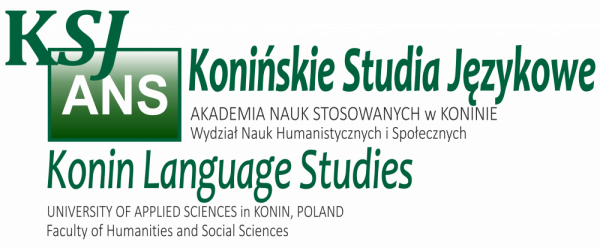PUBLISHING ETHICS FOR KONIŃSKIE STUDIA JĘZYKOWE
Publication Ethics compiled in accordance with COPE’s Code of Conduct
and Best Practice Guidelines for Journal Editors)
DUTIES OF EDITORS
Publication Decisions
The Editor-in-Chief is responsible for deciding which of the manuscripts submitted to the journal should be published. The Editor-in-Chief’s decision to accept or reject a paper for publication is based on its importance, originality, clarity, and its relevance to the scope of the journal.
Fair Play
The Editor-in-Chief and the reviewers evaluate manuscripts for their intellectual content without regard to the author’s race, ethnicity, gender, sexual orientation, religious beliefs, citizenship, or political ideology.
Confidentiality
The Editor-in-Chief and the members of the editorial staff must ensure that all material submitted to the journal remains confidential while under review. The Editor-in-Chief and the editorial staff must not disclose any information about the submitted manuscript to anyone other than the corresponding author, reviewers, other editorial advisers, and the publisher.
Disclosure and Conflicts of Interest
Unpublished materials disclosed in the submitted manuscript must not be used by The Editor-in-Chief and the members of the editorial staff in their own research without the express written consent of the author.
DUTIES OF REVIEWERS
Contribution to Editorial Decisions
The peer review process assists the Editor-in-Chief and the members of the editorial staff in making editorial decisions and helps the author to improve their manuscript.
Promptness
Any reviewer who feels unqualified to review the manuscript or knows that its prompt review will be impossible should contact the Editor-in-Chief so as to excuse himself from the review process.
Confidentiality
Any manuscripts received for review should be treated with strict confidentiality. They must not be shown to or discussed with others except when authorized by the Editor-in-Chief.
Standards of Objectivity
Reviews should be conducted objectively. Personal criticism of the author is inappropriate. Reviewers should express their views clearly, with supporting arguments.
Acknowledgement of Sources
Reviewers should identify relevant published work that has not been cited by the author. Any similarity or overlap between the manuscript under consideration and any other published paper should be reported to the Editor-in-Chief.
Disclosure and Conflict of Interest
Privileged information or ideas obtained through the peer review process must be kept confidential and must not be used for personal advantage. Reviewers should not consider manuscripts in which they have conflicts of interest resulting from competitive, collaborative, or other connection with any of the authors, companies, or institutions connected to the manuscript.
DUTIES OF AUTHORS
Reporting Standards
The authors of manuscripts should present an accurate account of the work performed as well as an objective discussion of its significance. Underlying data should be represented accurately in the manuscript. The manuscript should contain sufficient details and references to permit others to replicate the study. Fraudulent or knowingly inaccurate statements constitute unethical behavior and are unacceptable.
Data Access and Retention
The authors may be asked to provide the raw data of their investigations for editorial review, and should be prepared to provide public access to such data for a reasonable period of time after the publication of their paper.
Originality and Plagiarism
The authors should ensure that they have written entirely their own original work, and if they have used the work and/or words of others, it needs to be cited or quoted.
Anti-plagiarism measures
In order to guarantee originality and high quality of the published articles, the journal follows the established procedures in their evaluation and utilizes the plagiat.pl platform.
Plagiat.pl provides publishers with professional support in preventing plagiarism and other forms of academic misconduct. The system is a high-quality tool for comparing documents against the dbase of academic content obtained from numerous publishers.
Multiple, Redundant or Concurrent Publication
The authors should not submit manuscripts describing essentially the same research in more than one journal or primary publication. Submitting the same manuscript to more than one journal concurrently constitutes unethical publishing behavior and is unacceptable.
Acknowledgement of Sources
The proper acknowledgment of the work of others must always be given. The authors should cite publications that have been influential in determining the nature of the reported work.
Authorship of the Paper
Authorship should be limited to those who have made a significant contribution to the conception, design, execution, or interpretation of the reported study. All those who have made contributions should be listed as co-authors.
The corresponding author should ensure that all appropriate co-authors and no inappropriate co-authors are listed in the paper, and that all co-authors have seen and approved the final version of the paper and have agreed to its submission for publication.
Fundamental Errors in Published Works
When the author discovers a significant error or inaccuracy in his/her own published work, it is the author’s obligation to promptly notify the journal as well as to cooperate with the Editor-in-Chief to retract or correct the paper.
